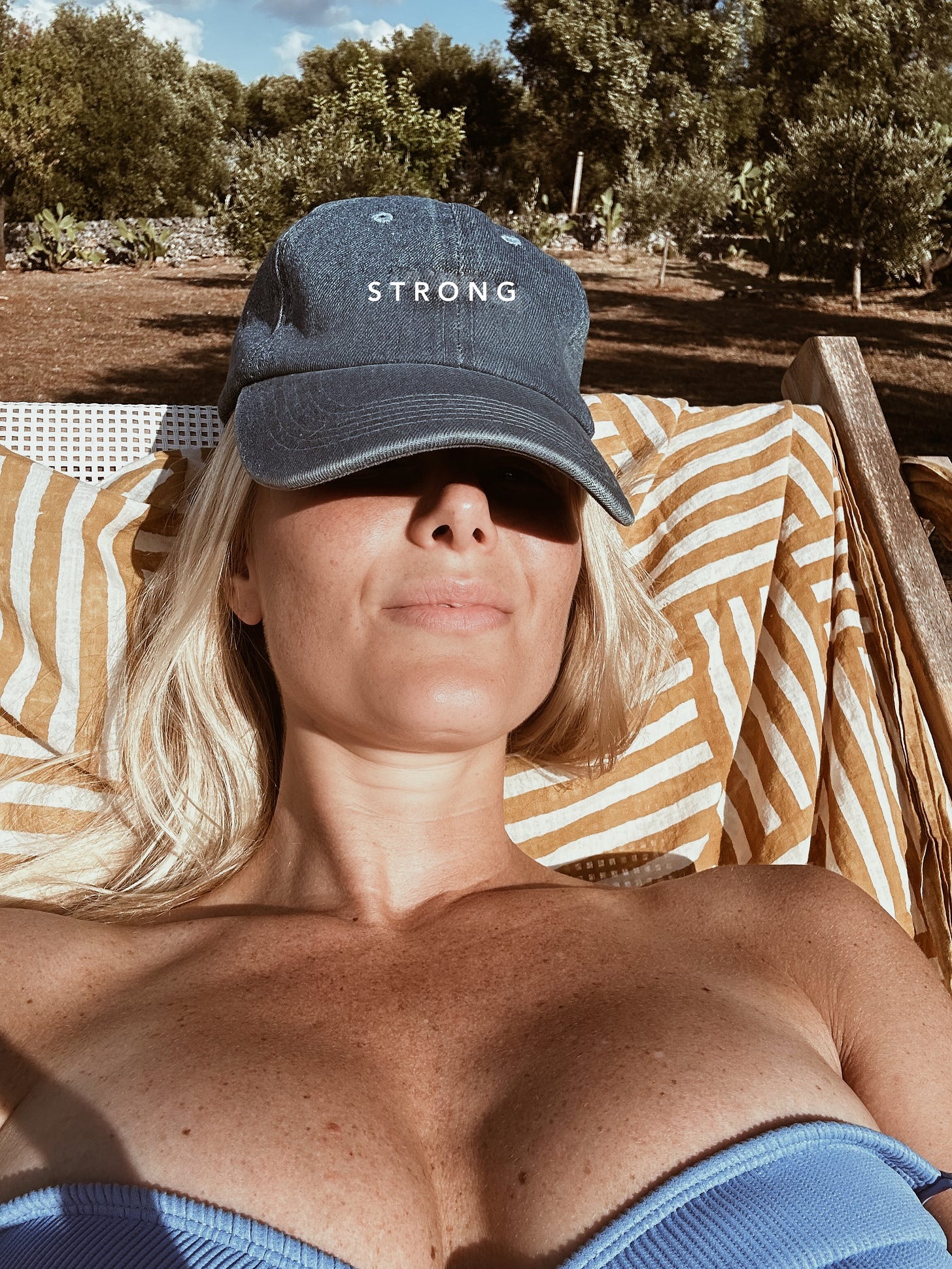For the best part of 30 years, I was ‘strong’. For the Gen Zs around here, strong was not what you wanted to be at school. The undertones of strong at high school in the 2000s between the ages of 10-18 meant butch, meant too muscly, meant unattractive, meant masculine. I was known as ‘Arnie’ - yes, named after the former bodybuilder turned California governor. You know, ‘terminator’.
Strong also meant I was captain of every sports team, I broke a bunch of records (mostly swimming, which for someone at 5’4” with the smallest hands and feet might be seen as impressive), I played for senior teams as a junior and I could hold my own against my older 6’2” brother. I’m fairly sure as a default of all of the above, it contributed to me becoming Head Girl (a sort of Valedictorian role for the Americans here). It wasn’t all bad.
Except at that age, I’ve come to learn, that a lot of it was all bad, because at that age your developing, vulnerable, adolescent brain shapes the rest of your life. Now, 36 years old and a few kilos lighter than I’ve been for an awfully long time, I realise just how weak I am - both mentally, and now, physically.
Don’t feel too sorry for me. I come from a happy home, I had an extremely privileged upbringing, I have loving parents who have given me the ultimate chance at life, I have the bestest of friends from school, I am successful. Life is good.

But you see, one doesn’t exempt the other. Being slimmer now, doesn’t exempt being strong back then (or vice versa). The truth is, ‘strong’ is engrained in me, even possibly, defines me. So engrained that I do not own a dress shorter than ankle length for fear of my “rugby player legs”; that two years ago I was so nervous about going on a summer holiday and being reminded about what I was putting in my mouth at every bite; that returning home meant my ‘arse’ would jokingly be sized against a country or state (most recently, Texas); or that I cry most times I go jeans shopping.
Well, I haven’t been jean shopping since I lost weight, but the narrative hasn’t changed despite the new, seemingly ‘positive’ re-position. My backside isn’t the size of Texas anymore, but the fact that it isn’t, is a talking point in itself (and I should stress, these comments are said with the best intentions): “Do you remember when her arse was the size of Texas?”. My now ‘normal’ legs became the subject of a secret photoshoot as we went for a dog walk at Christmas. Where exactly were these photos going? And, despite being told that I shouldn’t lose anymore weight, there’s the “careful, you don’t want to undo all the good work you’ve done”, with every mouthful.
So, strong vs skinny. Which is it? The reality is, my brain is so wired to one aesthetic that I don’t think I will ever not be ‘strong’. My further reality is I lost five kilos in two weeks during ‘My Second Marriage’ (for those who have been following along). Finally, I was slim. Hoorah?! Being ‘slim’ physically comes with praise and approval from society. I googled ‘slim’: (of a person or their build) gracefully thin; slenderly built (used approvingly). In contrast, being ‘slim’ mentally carries connotations of weakness or unpredictability. We’re one walking contradiction.
In the words of America Ferrara’s Barbie monologue, “You have to be thin, but not too thin. And you can never say you want to be thin. You have to say you want to be healthy, but also you have to be thin.”
So, how do I re-wire myself? CAN I re-wire myself? Honestly, I think I’m too far gone and ‘strong’ will forever be the appearance staring back at me in the mirror. But I did have one thought.
In the same way that in the Greek language there are multiple definitions for the word ‘love’ from, sexual, passionate love to platonic, friendly love to unconditional love (and many more in between), I wish ‘strong’ and ‘skinny’ had their own variations of the word. My self-perception, and the physical perception projected on to me as a child, of ‘strong’ is highly negative. But, let’s imagine for a moment we can differentiate conceptual forms and create new distinct words. Do we change perception? For example (and using the Greek words and their meanings but applied to body perception as best possible):
Philautia (not that kind!): the love I have for myself and the appreciation I have for my body
Pragma: my body’s actual capability to perform physical tasks
Philia: the healthiness and strength of my mind and its relationship to my body
Eros: A man’s sexual perception of my body / the sexualisation of my appearance
Mania: my body viewed and measured through societal standards - clothes sizes, depictions in magazines, media language
Storge: the functions and capabilities of a woman’s body - i.e pregnancy and the ability to grow life
Episteme: A medical understanding of the body’s capabilities in relation to disease or illness
There is a level of complexity to these labels but if I had been labelled ‘pragma’ at school, would I, in fact, have felt empowered back then? Or even now? By creating a word specifically for a man’s perception of my body, do I, on my own terms dictate when (and when not) I allow a man to judge my physical appearance? After all, there are times we want to feel sexy - but I get to label it as such. By defining ‘storge’, can women breastfeed in public without being sexualized or be pregnant without being called ‘fat’?
Food for thought. I guess for now, I’ll keep working a little on my philautia (yes, you can laugh) and my philia.




Heavenly tits